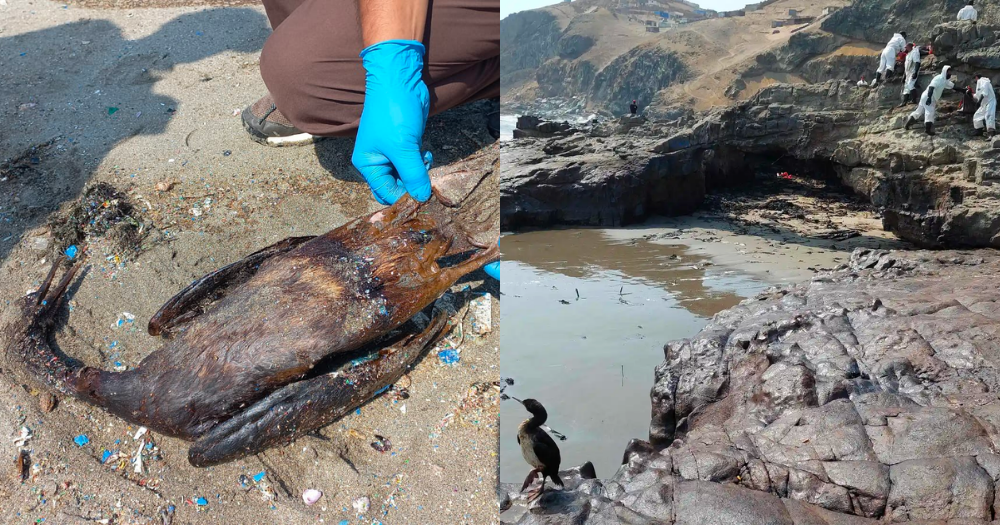Follow us on Telegram for the latest updates: https://t.me/mothershipsg
High waves from an underwater volcanic eruption in Tonga on Jan. 15 caused an oil spill along the coast of Peru, Reuters reported the Peruvian environment minister, Ruben Ramirez, as saying.
According to the Peruvian Civil Defence Institute, the spill reportedly occurred on Jan. 16 when a ship was unloading crude oil into the La Pampilla refinery.
The La Pampilla refinery, which is considered the main processing plant in Peru, is owned by a Spanish company called Repsol, Associated Press (AP) reported.
Eruption caused 1.2 metre tsunami wave
The earthquake caused by the eruption of the Hunga-Tonga-Hunga-Ha'apai volcano recorded a magnitude of 5.8.
The eruption lasted for eight minutes and caused a 1.2 metre tsunami wave in Tonga's capital 64 kilometres away, according to the Bureau of Meteorology in Australia.
The sonic boom from the eruption was audible even in Alaska, said the University of Alaska Geophysical Institute.
Strong waves generated from the eruption rocked the ship that was unloading the crude oil, allegedly causing it to spill.
6,000 barrels of crude oil spilled
Initially, it was unclear how much oil was spilled into the ocean.
However, Bloomberg reported that the tanker was carrying nearly one million barrels of Brazilian crude oil.
On Jan. 19, The Guardian reported that 6,000 barrels of crude oil had spilled into the ocean.
According to Ramirez, the oil spill damaged at least two and a half kilometres of the country's central coastline.
The minister added that the oil spill has affected two beaches, and authorities had to cordon off the coast to the public since Jan. 16, Reuters reported.
"I am seeing that there is a serious impact on the coastal marine area," Ramirez said, adding that the oil spill as "unfortunate".
The Agency for Environmental Assessment and Enforcement (OEFA) said that it had begun an investigation to determine who is responsible for the spill.
PM requested for compensation
Peru had demanded Repsol for compensation over the oil spill.
The Guardian reported that Peru's Prime Minister, Mirtha Vásquez, said that the refinery did not have a contingency plan in place for oil spills.
Peru's foreign ministry had also called on Repsol to "immediately compensate" the damage caused by the oil spill.
The ministry added that the spill had caused "serious harm to hundreds of fishermen's families".
They further said that the spill had put the flora and fauna in two protected natural areas in danger.
Refinery company denies responsibility
The refinery earlier said in a statement that the "violence of the waves" caused a "limited (oil) spill" while the ship was unloading, Reuters reported.
In response to the government's demands, Repsol's spokesperson, Tine Van Den Wall Bake, denied that the company should be responsible for the disaster.
"We did not cause this ecological disaster and we cannot say who is responsible," she said to the national radio station on Jan. 19, as quoted by The Guardian.
Peru's ministry for the environment said on Jan. 17 that Repsol could face a fine of up to US$34 million (S$45.8 million) as prosecutors begin an investigation into the company.
The refinery was also told to suspend its operations by the country's energy and mining regulating body, as authorities carry out their investigation.
Drew flak from environmental group
The company's tardy reply drew flak from the public and environmental groups.
One of which, Peruvian Society for Environmental Law, had criticised Repsol's "weak" response to the matter, The Guardian reported.
Christel Scheske, a conservation specialist from the group described the environmental and social impact of the spill in the short and long term as "devastating".
"The oil spill has affected a highly biodiverse part of the Peruvian coast, including two protected areas which are important not only for Peru’s astounding marine biodiversity," she said.
The spill also affected "for over 1,000 artisanal fishers in the region that depend on them," she added.
Scheske also said that heavy metals from the crude oil "will remain in the ecosystem for many years", and would render the seafood from the area harmful for humans to consume.
Local fishermen protested
Local fishermen in the area had also protested outside the La Pampilla refinery in Callao province on Jan. 19, AP reported.
They carried a flag of Peru, as well as signs that read "no to ecological crime," "economically affected families" and "Repsol killer of marina fauna".
The fishermen had requested to speak to the company's representatives but AP reported no one from the company had approached them.
The leader of the fishermen, Roberto Espinoza, said that the oil spill is a "massacre of all the hydrobiological biodiversity".
"In the midst of a pandemic, having the sea that feeds us, for not having a contingency plan, they have just destroyed a base of biodiversity," he added.
Follow and listen to our podcast here
Top images via Oceana_Peru/Twitter and Getty images
If you like what you read, follow us on Facebook, Instagram, Twitter and Telegram to get the latest updates.
